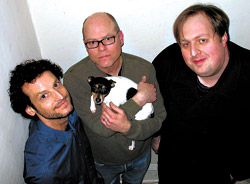I’m one of those Luddites who still listens to cassettes quite frequently. Part of this is simply because I have a tape deck in my car, but also because I still have a rather staggering collection of stellar mixtapes that go back as far as 15 years. Obviously, they endure with varying degrees of playback quality. Some are lovingly warped to an inaudible degree, but many hiss and warble in a manner that just adds character to songs I already enjoy. “Glider” by My Bloody Valentine arguably improves with disorienting fluctuations in tempo and sonic density, and there are a handful of early Flaming Lips songs that unexpectedly benefit from the surreal underwater sound that comes from elasticized tape.
There’s actually a delightful, accurate-sounding term for this: wow and flutter. Artful electronic noise architects Stereolab picked up on it when they named their 1994 EP after the naturally occurring audio phenomenon, as did Portland-based band Wow & Flutter, who formed in 1997. The band released their sixth studio album, Golden Touch (Jealous Butcher), last November.
Fans of Wow & Flutter can see them in Seattle next week at Sunset Tavern. When I reach bandleader Cord Amato at his Portland home via phone, he’s a gregarious, if groggy, interview subject. He’d been out late the night before, catching a show by his peers in the Ax. “They’re good friends, and you gotta support the locals,” he says with a beleaguered yawn. Despite the factually misleading bio on the band’s MySpace page implying they’re 20-something prodigies, Amato’s no spring chicken. “Well, we started the band when we were 12 and now we’re 24,” he says with mock seriousness. “It’s probably time to change that bio. Our bass player took the bio of some young Christian rock band and switched out the names. Now when we book shows, the agents keep saying ‘Oh, you guys are underage, when you get here you’ll have to wait outside the venue ’til you play.’ But I’m 39 and our drummer must be 44 now,” he laughs.
Wow & Flutter originally started as a recording project in Amato’s basement studio in Portland. He sent his first recordings to a friend in New York who was interested in putting them out. “He asked me if I had a band, and I said ‘Yeah, I have a band,’ even though I didn’t. So I had to put one together in order to tour and support the record.”
Over the years, that band’s membership has ebbed and flowed, with Amato, drummer Jack Houston, and bassist Ryan Matheson as its core. “We’ve had a lot of different members; I think at one point we were a seven- or eight-piece with a cello and a Fender Rhodes,” Amato says. “But now we’re just a trio. It’s a lot easier to manage.”
While the stripped-down lineup may have been easier to handle, the approach the band took with Golden Touch was a deliberate challenge to their previous methods of recording. They had always helmed their recordings solely as home studio–based projects, without any outside production assistance. This time they enlisted the help of engineer/producer John Askew, and holed up at Type Foundry Studios in Portland. “We figured that it was our sixth album and we should try working with someone else,” explains Amato. An outside perspective proved beneficial, if occasionally trying, with Askew pushing them far out of their comfort zones to work with new approaches to percussion, arrangements, and tones. “[We] like the way the record came out, and we’ll probably want to work with him again—but the recording process was kind of torturous, especially for our drummer.”
If that torture is what made the record so successfully genre-straddling, then they should keep Askew in the mix. It’s an absorbing, wide-ranging record that swings stylistically from arty post-punk to classic American rock anthems and back to spaghetti-Western dirges with an impressive amount of graceful cohesiveness. It’s adventurous and smart, and has sleeper hit written all over it—especially for anyone whose record collection happens to include both Six Finger Satellite and Tom Petty. Amato says he doesn’t see anything brainy about it. “It’s just rock ‘n’ roll. I get into Ennio Morricone–type music for a while and I’ll start pulling stuff like that into the music, but I also listen to a lot of Sonic Youth. I think I just want to keep it different—I don’t want to play the same stuff all the time.”








